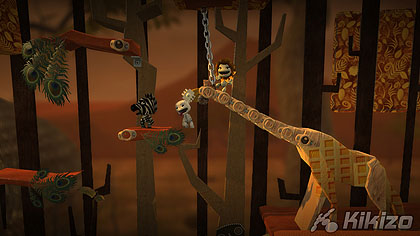LittleBigPlanet: The Very Big Interview
We talk to Media Molecule co-founders Mark Healey and Alex Evans, as well as Sony's Pete Smith, to get the FULL story behind the big PS3 game from a little British studio.
Page 2
What's more impressive about this is that Smith actually means it - even if it risked the sort of levels included on the disc, Smith and the Media Molecule team were adamant that things should be done this way. "That's proven absolutely pivotal," he says. "It was one of the best decisions we made. It's been absolutely painful, but I can say to you 100 percent, if you see any screenshot of our game, you can probably one-up us on that.
"One of the coolest things is that a lot of our levels will be marked as copyable, which basically means that users can take our entire levels and mod them. And that really does prove that it's done the way it looks." Among the interesting ideas popping up already is a binary adding machine, created by a developer based on something he saw from an intrepid member of the community on YouTube.
Don't worry if this all seems a bit too taxing for your liking. It gets easier. The team watched carefully as testers became more comfortable with the mechanics of designing a level, and what they found was that people started to become comfortable by around the second day. The team is also cognizant that players will have varying predilection for the creative aspects of the game. The result is a layered system that lets players get as involved as they want. "We have this kind of tweaking system," says Evans, "so that you can just plonk stuff down and it picks reasonable defaults for everything but if you're a hardcore creator you can go in there and nail stuff. It's tough.
"One of the interesting things is that the more we've removed, generally the better the quality of the stuff that comes out. Originally you could make infinitely deep levels. Now we've got this layering system. There's not really any actual technical reason we did that but what we found was that when there were infinite layers our own level designers didn't like it. They were making some amazing levels, but at soon as we reined that in, it all got easier. Their turnaround got quicker. I have more respect now for people like Apple or Sony even making complex stuff simple. That's been a battle, but worth fighting."
Something that has received a lot of positive attention is the unique presentation. The quasi-3D provides depth to creators while still suppressing the major challenges of going fully 3D. Smith says that "Part of the beauty of the game being 2D is that it keeps it really simple, and that really helps. If you were trying to make your own gameplay in full 3D, there'd be a lot more to consider. I don't know if it would be possible, but there would be a lot more to think about. We don't see 2D as a copout."
With that said, the levels you'll be able to create will be anything but simple. The game has hard-coded limits on the amount of stuff you can add into any particular level but this was necessary to make sure that people didn't go completely berserk. You'll hit a wall when your level becomes too big but the allowance is very generous. "It's pretty ginormous actually," says Smith.













 Satoru Iwata Video Interview - the late Nintendo president spoke with Kikizo in 2004 as 'Nintendo Revolution' loomed.
Satoru Iwata Video Interview - the late Nintendo president spoke with Kikizo in 2004 as 'Nintendo Revolution' loomed. Kaz Hirai Video Interview - the first of Kikizo's interviews with the man who went on to become global head of Sony.
Kaz Hirai Video Interview - the first of Kikizo's interviews with the man who went on to become global head of Sony. Ed Fries Video Interview - one of Xbox's founders discusses an epic journey from Excel to Xbox.
Ed Fries Video Interview - one of Xbox's founders discusses an epic journey from Excel to Xbox. Yu Suzuki, the Kikizo Interview - we spend time with one of gaming's most revered creators.
Yu Suzuki, the Kikizo Interview - we spend time with one of gaming's most revered creators. Tetris - The Making of an Icon: Alexey Pajitnov and Henk Rogers reveal the fascinating story behind Tetris
Tetris - The Making of an Icon: Alexey Pajitnov and Henk Rogers reveal the fascinating story behind Tetris Rare founders, Chris and Tim Stamper - their only interview? Genuinely 'rare' sit down with founders of the legendary studio.
Rare founders, Chris and Tim Stamper - their only interview? Genuinely 'rare' sit down with founders of the legendary studio. The History of First-Person Shooters - a retrospective, from Maze War to Modern Warfare
The History of First-Person Shooters - a retrospective, from Maze War to Modern Warfare